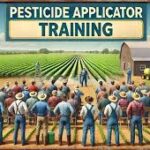When it comes to managing pests effectively and safely, pesticide training plays an indispensable role. This type of education is not just a legal requirement in many areas but also a critical component in ensuring safety for individuals and the environment. Whether you’re a professional looking to expand your skill set or a homeowner aiming to protect your property, understanding the nuances of pesticide training can make all the difference.
Why Is Pesticide Training Important?
Pesticides, while essential for controlling harmful pests, can pose significant risks if misused. The training ensures that users are equipped with the knowledge to:
- Handle chemicals safely
- Minimize environmental impact
- Comply with local and federal regulations
- Protect their health and the well-being of others
Understanding the science behind pesticides, their applications, and their risks can prevent accidents and enhance the effectiveness of pest control measures.
Who Needs Pesticide Training?
Pesticide training is beneficial for a broad audience, including:
- Licensed Applicators: Professionals who apply pesticides as part of their job, such as agricultural workers, landscapers, and pest control technicians.
- Farmers and Growers: Individuals responsible for crop production and pest management in agricultural settings.
- Homeowners: Those who want to ensure safe pesticide use in their homes or gardens.
- Public Health Workers: Professionals involved in controlling pests that affect public health, such as mosquitoes and rodents.
Key Components of Pesticide Training
Pesticide training programs often cover several critical areas to ensure comprehensive knowledge:
1. Understanding Pesticides
- Types of pesticides (herbicides, insecticides, fungicides, etc.)
- How pesticides work and their chemical properties
- The importance of selecting the right pesticide for the job
2. Safety Measures
- Personal Protective Equipment (PPE) usage
- Safe handling and storage practices
- First aid measures in case of exposure
3. Application Techniques
- Proper mixing and dilution methods
- Equipment usage and maintenance
- Techniques for effective and precise application
4. Environmental Protection
- Understanding drift and runoff
- Methods to minimize environmental impact
- Importance of preserving beneficial organisms
5. Regulatory Compliance
- Local and federal laws governing pesticide use
- Licensing and certification requirements
- Recordkeeping and reporting obligations
Finding the Right Pesticide Training Program
When choosing a pesticide training program, several factors should be considered:
- Accreditation and Certification: Ensure the program is accredited by a recognized authority and offers certification upon completion.
- Comprehensive Curriculum: Look for courses that cover all the essential components mentioned above.
- Format and Accessibility: Decide whether you prefer in-person training, online courses, or a hybrid model based on your schedule and learning style.
- Reviews and Recommendations: Research reviews and ask for recommendations from peers or industry experts.
Benefits of Professional Pesticide Training
1. Enhanced Safety
Professionals trained in pesticide use can significantly reduce the risk of accidents, injuries, and health issues.
2. Improved Effectiveness
Proper training ensures that pesticides are used efficiently, saving time and resources while achieving desired results.
3. Legal Compliance
Completing a certified program helps users meet regulatory requirements, avoiding fines or legal issues.
4. Environmental Stewardship
Trained applicators are more aware of environmentally friendly practices, contributing to sustainable pest management.
Tips for Succeeding in Pesticide Training
- Be Prepared: Review the course material ahead of time and familiarize yourself with basic pesticide terminology.
- Stay Engaged: Actively participate in training sessions and ask questions.
- Practice Safety: Always follow safety protocols during practical sessions.
- Take Notes: Keep detailed notes for future reference and examination preparation.
Beyond Training: Building a Career in Pest Management
For those pursuing a career in pest control, pesticide training is just the beginning. Additional steps to advance in the industry include:
- Gaining Experience: Work with seasoned professionals to build practical skills.
- Continuing Education: Attend workshops and advanced courses to stay updated on new techniques and regulations.
- Specializing: Focus on niche areas such as organic pest control, fumigation, or integrated pest management (IPM).
Final Thoughts
Pesticide training is a crucial investment for anyone involved in pest control. It equips individuals with the knowledge and skills needed to use pesticides safely and effectively, ensuring the protection of human health, property, and the environment.
Whether you’re looking to enhance your expertise or embark on a new career, finding the right training program is the first step toward responsible pest management. By following the guidelines and tips outlined above, you can confidently take the next step in your journey.

